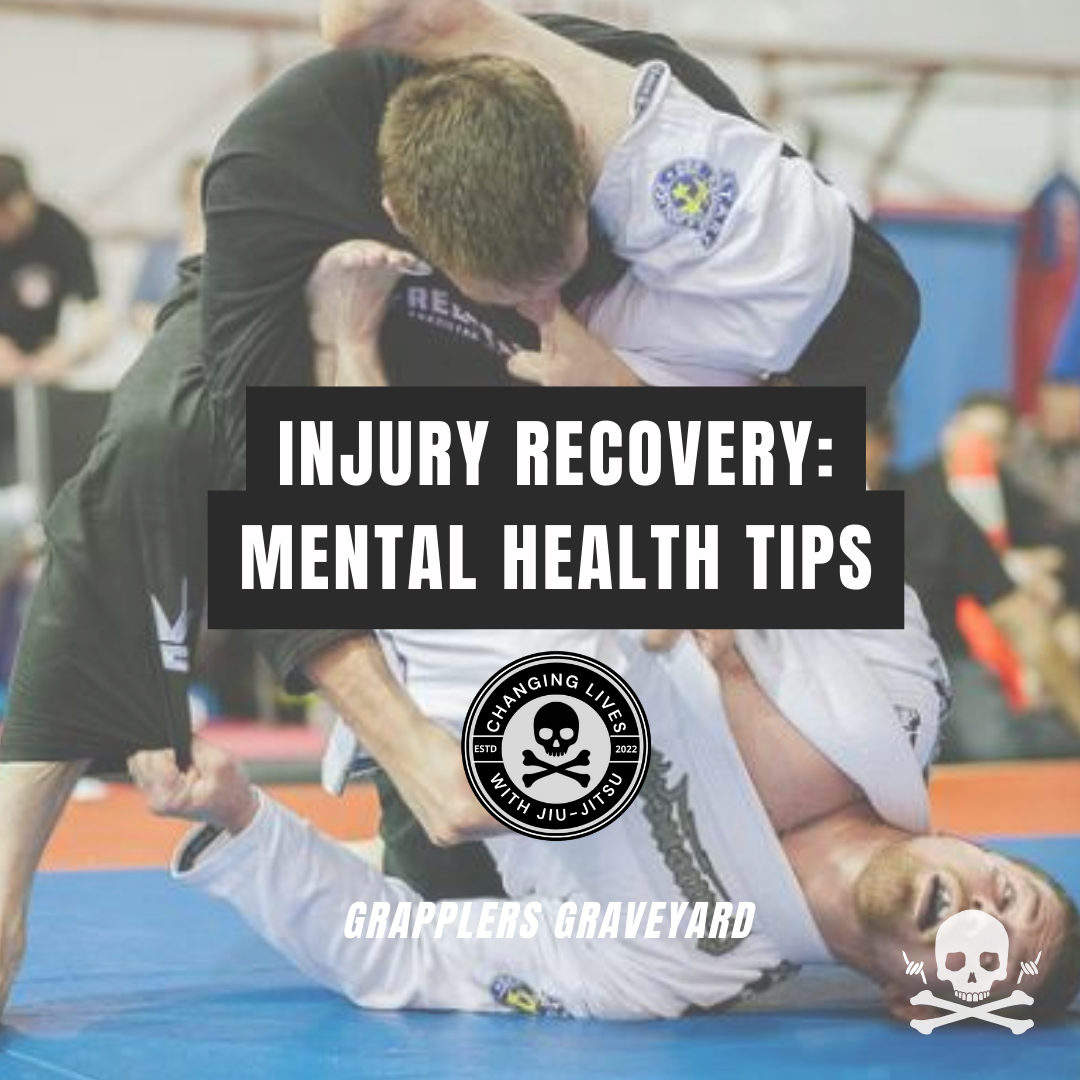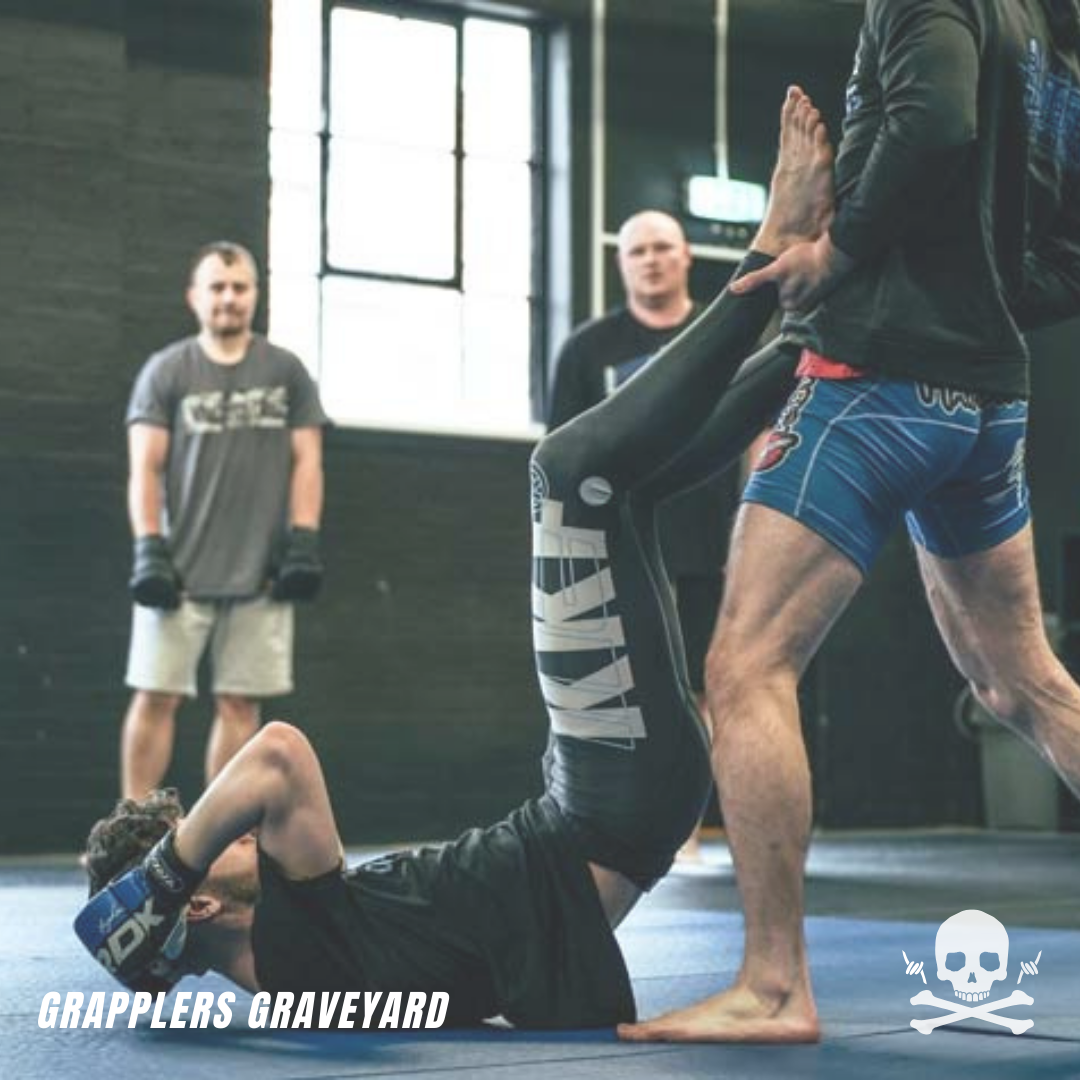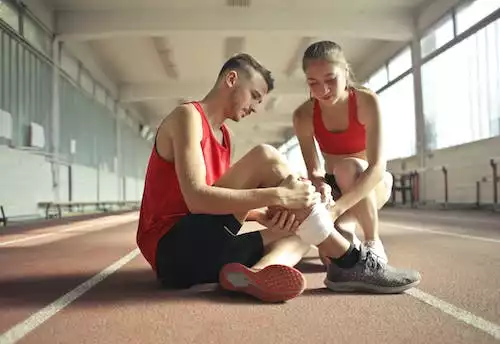Denali Keefe
In any combat sport, injuries are unfortunately unavoidable. If you’re lucky they are infrequent and insignificant. When recovering from an injury we often consider the physical steps that we need to take, but that’s only half the battle. The mental steps are just as, if not more, important.
Mental health tips for recovering from an injury
Three keys to mentally recovering from an injury are embracing your community, taking it one day at a time, and seeking support when necessary.

How Being Injured Can Affect Your Mental Health
An injury can affect Mental Health in a variety of ways. The two main impacts that injury can have are a break in routine and catastrophization of the injury. When these things occur it can start to feel impossible for the injured person to rehab and get back to the gym.
A Break in Routine
Many people join combat sports for both the camaraderie and the routine workouts that come with them. These relationships and workouts are very beneficial to one’s mental health. This is due to several psychological factors. When an athlete’s routine lapses due to injury, they can have an increase in both anxious and depressive symptoms. These can range from a feeling of missing out (FOMO) on training with their teammates to a feeling that they will never get back to their old form (Catastrophizing).
Catastrophizing
If an injury is bad enough or taking longer than expected to heal, the athlete can start to catastrophize the severity of their injury. The best way to think about catastrophizing an injury is as a cognitive distortion or exaggeration of the severity of an injury or its potential consequences. When someone catastrophizes an injury, they tend to focus excessively on the worst possible outcomes, magnifying the pain, disability, or long-term effects associated with the injury.
This can lead to a large increase in anxiety and distress, which may impact someone’s ability to cope effectively with the injury and impede their recovery process. Catastrophizing can manifest in many ways, such as constantly worrying about the injury worsening, believing that the injury is much more serious than it is, or dwelling on the potential negative implications the injury might have on one’s life or future activities. This means that the athlete may believe that they will never be able to train or attain the same level of proficiency that they once had.
Catastrophizing can even lead to some people believing that they will never be able to train again. When this spiral occurs people can lose the drive to rehab their injury.
A common example of this would be when a jujitsu practitioner has an ACL tear. When this happens they may believe that they will never be able to perform a double-leg or single-leg takedown again. Believing this, they may have poor mental health causing them to lose the motivation to properly recover. This is how injured athletes can spiral into mental health issues that hinder physical recovery.
Are you suffering from a sports-related injury? Find an online rehab program to help solve the problem! We have partnered with sports med professionals with love 20 years of experience to provide you with in-class service!
- Online Rehab Programs
- Cost Effective & Convenient
- Connect With Industry Experts

Why is an athlete’s mental health so important to sports injury recovery?
An athlete’s mental health is key to injury rehabilitation. Without the proper motivation and support system, injured athletes will be unable to put in the time to truly work their way back from injury.
Embracing the Community
Embracing the gym’s community can ensure that an athlete’s mental health stays strong in the face of a sports injury. Regardless of the gym type -Jiu Jitsu, Muay Thai, Krav Maga, Wrestling, Boxing etc.- a student athlete’s training partners are a wonderful source of friendship and wisdom. Another term for this is social support.
Because combat sports can be physically and mentally demanding, suffering an injury can lead to feelings of isolation and frustration. The community—coaches, teammates, training partners, and supporters—can provide emotional support, empathy, and encouragement during these difficult times.
Sharing experiences with those who understand the challenges of combat sports can alleviate feelings of loneliness and boost morale. Depending on the injury severity it may seem pointless to go into the gym, however just being around your training partners and coaches can help to improve mental health. Just showing up may be enough to reduce symptoms of depression and anxiety.
Taking Rehabilitation Day-by-day
When an athlete is first injured the experience can be very traumatic. Even if the injury itself is not painful it can stick around psychologically causing stress and pain which can diminish the athlete’s quality of life. The psychological effects of an injury can be made worse by viewing rehab as a long terrible road to full recovery. If the injured athlete, instead, looks at the rehab as a few exercises each day, the stress can diminish significantly which will, in turn, lower overly emotional responses.
Seeking Support for Mental Health
Sometimes showing up to the gym and following all the tips and tricks is not enough. If an injured athlete starts to feel hopeless or that their mental health diminishing, it is time for an athlete to go to a mental health professional.
While once a taboo subject in the martial arts world, mental health issues are now being treated with the respect that they deserve. There are even several mental health professionals with degrees in counseling (LCPC) and social work (LCSW) that focus on sports mental health exclusively.
Today, there are many sports psychologists, who focus on the psychological factors within combat sports. These clinicians include the rehabilitation journey but also can provide help with performance after rehabilitation from the sports injury is complete.
The medical team that a recovering athlete uses should have at least one member who is confident in working with mental health and understands the psychological risk factors associated with a traumatic injury. It is also important to keep an eye on more serious mental health issues that may arise from any extended time away from training.
Are you suffering from a sports-related injury? Find an online rehab program to help solve the problem! We have partnered with sports med professionals with love 20 years of experience to provide you with in-class service!
- Online Rehab Programs
- Cost Effective & Convenient
- Connect With Industry Experts

How can athletes develop self-management skills?
Athletes can cultivate self-management skills through deliberate practice and consistent effort, enabling them to optimize their performance, well-being, and overall success in their athletic endeavors. Firstly, setting clear and realistic goals is necessary. Rehabilitation requires the same strict goals as training for a competition.
Athletes should establish both short-term and long-term objectives that are specific, measurable, and attainable. These goals provide a roadmap for progress and motivation. Prioritizing tasks, creating schedules, and minimizing distractions are essential components of successful time management.
Self-awareness also plays a critical role in self-management. Injured athletes should cultivate an understanding of their strengths, weaknesses, emotions, and psychological responses to various stressors.
By recognizing their limitations and triggers, injured athletes can implement coping mechanisms and strategies to regulate their thoughts, emotions, and behaviors effectively. Adequate sleep, nutrition, hydration, and recovery practices are essential for optimizing athletic performance and minimizing the risk of injury.
Finally, developing effective communication and interpersonal skills is crucial for building relationships, collaborating with teammates and coaches, and seeking support when needed. By honing these self-management skills, athletes can enhance their recovery, well-being, and overall satisfaction in sports and life.
Are you suffering from a sports-related injury? Find an online rehab program to help solve the problem! We have partnered with sports med professionals with love 20 years of experience to provide you with in-class service!
- Online Rehab Programs
- Cost Effective & Convenient
- Connect With Industry Experts
Conclusion
In conclusion, prioritizing mental health is paramount for athletes recovering from combat sports injuries. The journey to rehabilitation extends beyond physical healing; it encompasses emotional resilience, psychological well-being, and holistic self-care. By acknowledging the mental challenges inherent in injury recovery, athletes can take proactive steps to nurture their mental health and optimize their recovery outcomes.
Injured athletes need to cultivate self-awareness and acknowledge their psychological responses to injury, whether it be frustration, depression, or anxiety. Through self-compassion and acceptance, athletes can navigate the emotional rollercoaster of recovery with greater ease, fostering a sense of inner resilience and strength.
Seeking support from a trusted network of coaches, teammates, and mental health professionals can provide invaluable emotional support and guidance throughout the recovery process. Whether through therapy, support groups, or informal conversations, connecting with others who understand the unique challenges of combat sports can alleviate feelings of isolation and provide a sense of camaraderie. Furthermore, maintaining a healthy lifestyle encompassing proper nutrition, hydration, sleep, and physical activity is foundational to supporting mental well-being during recovery.
Nourishing the body with nutritious foods, staying hydrated, prioritizing restorative sleep, and engaging in gentle movement can promote physical healing and reduce problematic emotional reactions. Ultimately, by recognizing the interconnectedness of mind and body in the recovery process, athletes can empower themselves to overcome injury and emerge stronger. Embracing the importance of mental health in combat sports injury recovery is not only essential for returning to sport but also for cultivating lifelong resilience and well-being.
Through an understanding of community support, proper mental health support, and patience, injured athletes can navigate the challenges of recovery with grace and emerge from the experience with newfound strength and resilience. At the end of the day, it is critical to recognize the ways that physical health and mental health are interconnected.
Newsletter
Signup for news and special offers!
Thank you!
You have successfully joined our subscriber list.

